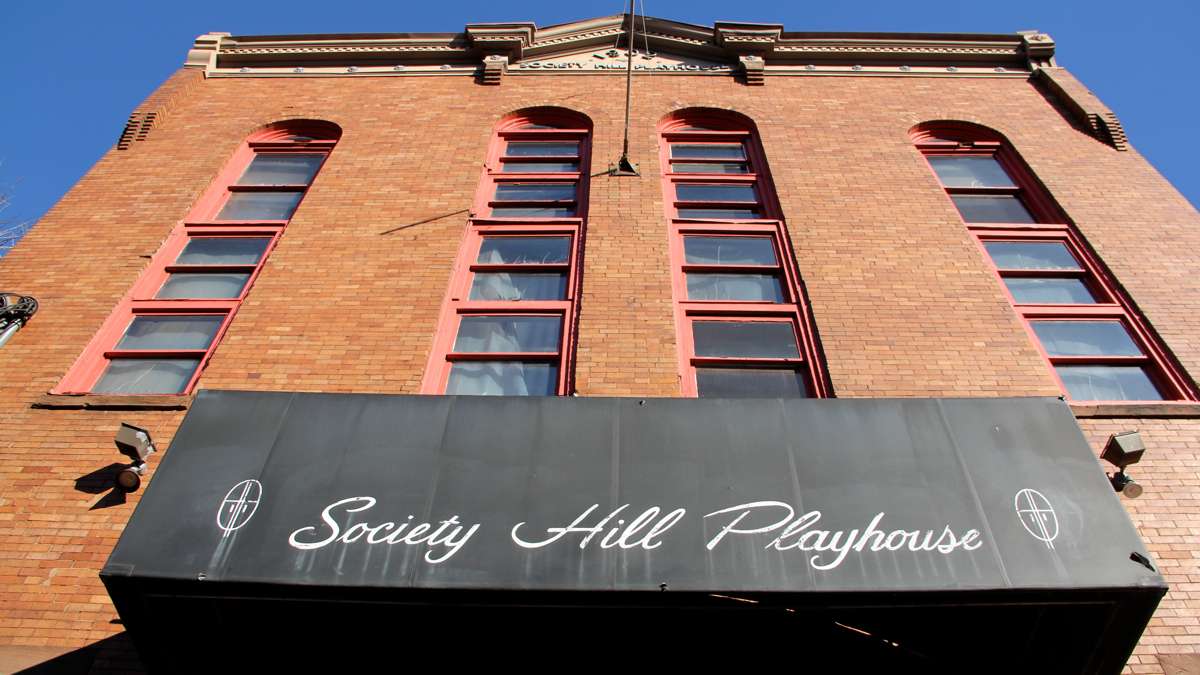After 56 years, Society Hill Playhouse approaches final curtain call
ListenA landmark of the Philadelphia theater scene will soon be closing forever. The Society Hill Playhouse, which has operated as a theater at Eighth and South streets for 56 years, is slated for demolition next month.
Its final performance this weekend will be the debut of the first play by Liberty City Radio Theatre.
The play comprises three old-time radio dramas performed on stage with live Foley sound effects and musical interludes. Two stories were adapted from scripts written for radio in the 1930s, while the third is an original noir mystery written by producer Bill Arrowood.
“The show is done as a tribute to this theater,” said Arrowood. “We wanted to go out with a great show, a funny show, allowing people to recognize the value of this theater in the history of Philadelphia drama.”
Arrowood’s day job is assistant director of the South Street Headhouse District, a neighborhood services organization. Last fall, armed with a grant from the Knight Foundation, it sought to partner with the playhouse to leverage the arts as a way of improving the neighborhood. Almost immediately, Arrowood learned the theater had decided to throw in the towel.
“If you’re going to close the theater, I want to do a show here,” he said.
Society Hill Playhouse was opened in 1960 by a couple, Jay and Deen Kogan. Fresh out of college, they were determined to bring the avant-garde to Philadelphia, introducing plays by James Joyce, Günter Grass, and Jean-Paul Sartre. Works by Bertolt Brecht and Jean Genet had their U.S. premieres at the playhouse.
“We wanted to do the modern work, new work by contemporary playwrights,” said Deen Kogan. “Part of the mission, also, was to involve the communities — people who maybe didn’t go to theater.”
In 1968, in the wake of the assassination of Martin Luther King Jr., the theater drove its racially integrated company into Philadelphia neighborhoods, performing plays in the streets upon a flatbed truck. In the 1970s, it created a program to bring elderly audiences into the theater.
The playhouse helped launch the careers of Sherman Hemsley (“The Jeffersons”), Richard Roundtree (“Shaft”) and Kevin Bacon, among others.
Twenty-five years in, the Kogans happened upon a musical comedy performed in a small New York theater. It was a farce called “Nunsense,” which Deen Kogan dismissed as a “ladies musical.”
“Miss Know-It-All, here, I said to my husband, ‘I guess we could get five weeks out of it,'” she said. “It ran 10 years.”
Because “Nunsense” dominated the stage for so long, the Kogans built a smaller cabaret theater downstairs, where they could continue to program edgier stuff.
They expanded to a second location — Society Hill Playhouse West at 22nd and Walnut streets — for three years. On Friday nights the Kogans would drop the curtain in Society Hill then race off to lift the curtain across town.
“We’d leave [Society Hill] and everybody would wave and say, ‘Goodbye! Go to Siberia!” Kogan remembers. “It was kind of tough running both.”
Jay Kogan died in 1993. Deen kept the theater going for decades. Last year the Toll Brothers construction company offered to buy the building in order to demolish it and build condos. After 56 years, it was an offer Deen Kogan couldn’t refuse.
“The fiscal challenges are heavier. This is not a social theater. I never went for a law firm to underwrite the play. Getting funding is much harder,” she said. “I’ve reached the point where I don’t want to bother.”
The end of the Playhouse will not be the end of Kogan. Since 1989, she has been in involved with mystery fiction conferences, most prominently NoirCon, hosted at the playhouse. She chairs the International Association of Crime Writers Hammett Award Committee, and continues to pursue literary interests at Port Richmond Books.
“I’m thinking of replicating the cabaret up there,” said Kogan. “I don’t want to lose the attraction that theater has. I think I can still do something with it.”
The playhouse archives will go to Temple University, where the Kogans studied, and some pieces of the theater will be warehoused by the Philadelphia History Museum. Other items will be sold at an indoor yard sale, March 13.
WHYY is your source for fact-based, in-depth journalism and information. As a nonprofit organization, we rely on financial support from readers like you. Please give today.











